
Picture those 1950s movies, where crimson convertibles race above the French Riviera, weave through lavender fields or climb towards abandoned fortresses.
You can absolutely do the same thing on a French road trip!
I live in France and have my own car, but this is a large country and driving from my home to a destination across the country isn't always convenient. Sometimes, I'll take a train to my destination and rent a car when I get there.
NOTE: Pages on this site may contain affiliate links, which bring in a small commission at no cost to you.
🚗 NO TIME TO READ EVERYTHING?
🏷️ JUST WANT THE BEST CAR RENTAL FRANCE PRICES?
Before you rent, make sure you check prices – they can vary widely, so I use Discovercars to compare all major companies and check availability, and come up with the best bargains.

12 Essential car rental in France tips
The following tips will ensure your France car trip is exciting, glorious, and trouble-free!
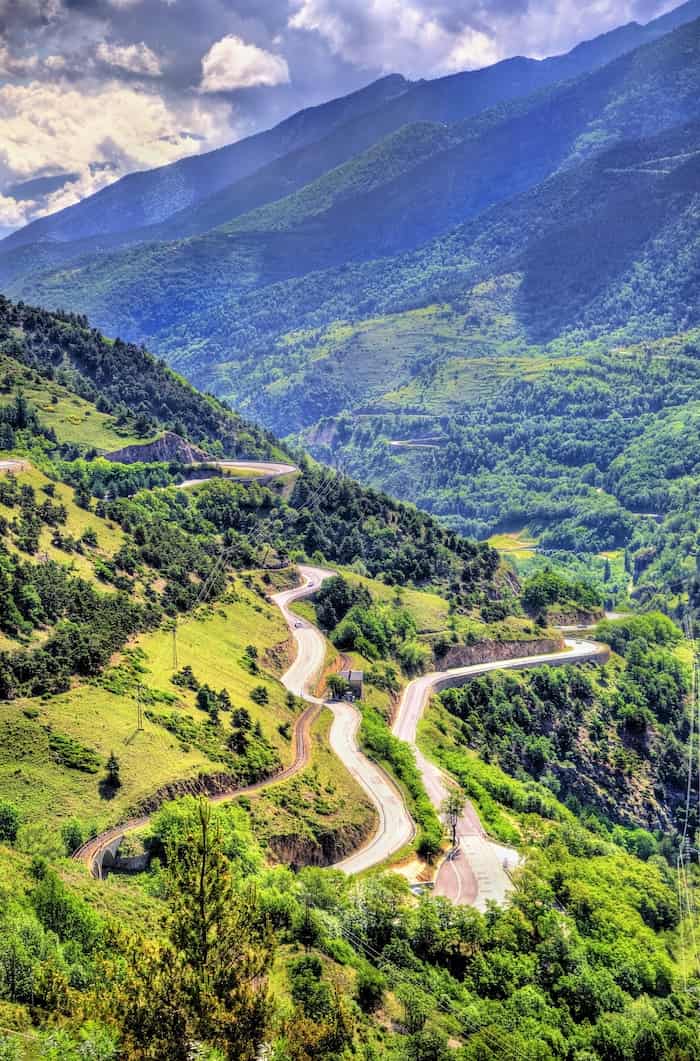
Some of France's most scenic spots can only be accessed by car
Cost is a major factor in the decision to rent a car and the cost of hiring a car in France per day will vary. Compare car prices in France if you already know where you're going, and scan the page for car rental – France deals – which are often available.
There has been price creep and cheap rental cars in France are becoming rare. That said, you can still keep costs down:
PRO TIP ➽ Reserve your car early. Prices are usually lower when there is plenty of supply. The closer you get to holiday season, the scarcer – and more expensive – the car, especially if you want an automatic transmission. 🚗 CLICK HERE FOR YOUR CHEAP CAR RENTAL FRANCE
Car rental companies will usually require a credit rather than a debit card, so make sure you have one, or check that the rental agency accepts debit cards.
One thing to watch for are hidden or additional costs when renting cars in France.
Most car rental transmissions are manual, although the number of automatic cars available for rental in France is increasing.
Automatics usually cost more to rent, and they are less common.
Also, be aware that if you have a licence that only allows you to drive an automatic car, you won't be able to rent a stick shift car.
Each French car rental agency will have its own conditions and add-ons, which you'll have to check. They also have different age policies, fuel policies or driver requirements.
But what they all share is the list of basic documents you'll need for your rental:
Driving in France requirements are relatively straightforward and similar to those of other European countries.
If you're from Europe or the EEA, your national driver's licence is all you'll need. If you're from outside Europe, the plot thickens.
If you run into trouble, have an accident or are checked by police, they need to be able to read your licence, and many do not read English, hence the need to have a licence in French.
If your licence isn't written in French – which will undoubtedly be the case if you're from an English-speaking country – you'll need a translation, but you'll have to get it before you leave home.
There are two ways to do this.
1) Get an International Driver's Permit (IDP) or licence (you can get one here).
2) Get an official, accredited translation of your licence from a translator listed with the French embassy. This is cumbersome and expensive, and an IDP is the better option (not to mention you'll be able to use it in other countries as well).
I do have to tell you that tourists are often able to rent a car with their own licences in English, but I wouldn't chance it. If you do get into a fix, help may be delayed and there may be insurance issues if you don't have the proper licence, so do yourself a favor and get the right paperwork before you leave home.
This may sound silly in this electronic day and age but you'll see the wisdom of it when the GPS takes you into a wheat field or down a street that has been pedestrianized for a couple of years.
GPS systems in cars are notoriously antiquated and rarely updated.
Also, there are often comprehension issues: street names will be mispronounced, and you'll be looking for a road number while the GPS gives you a name.
Avoid all this hassle and get a physical map or road atlas. I have the French edition of the Michelin Road Atlas and I also use this Michelin map (along with plenty of regional and local maps).
You'll find most any car available for rental in France, from tiny budget cars to luxury vehicles. Whatever you choose, there are a number of things to consider when renting your car in France.
Most rental cars come with the necessary equipment but double-check, just to be sure:
If you plan to drive in cities, your car should have a Crit'Air sticker or vignette. What's that, you say?
In their efforts to reduce pollution, many cities have established a pollution grading system for cars. On particularly polluted days, the city may ban cars that don't meet Crit'Air 1 or 2 from their downtown core. Usually, the ban is up on a bulletin board for all to see, at the entrance of the low-emission zone. Usually, but not always.
If you don't have a Crit'Air sticker on your car at all, or if the number is higher than 2, stay away from city centers, because in some, the ban is year-round.
That said, most rental companies renew their stock regularly so they'll have newer models, all of which meet the pollution criteria – and which should carry a sticker. Ask, because better safe than sorry.
If you're driving in winter, some regions of France require you by law to have either snow tires or carry chains in the car. Make sure your car is equipped if you're planning to drive in any of these departments between 1 November and 31 March. This also applies even if you are simply driving through.
DEPARTMENTS REQUIRING SNOW TIRES
Ain (01), Allier (03), Alpes-de-Haute-Provence (04), Hautes-Alpes (05), Alpes-Maritimes (06), Ardèche (07), Ariège (09), Aude (11), Aveyron (12), Cantal (15), Corrèze (19), Corse-du-Sud (2A), Haute-Corse (2B), Côte-d’Or (21), Creuse (23), Doubs (25), Drôme (26), Gard (30), Haute-Garonne (31), Hérault (34), Isère (38), Jura (39), Loire (42), Haute-Loire (43), Lot (46), Lozère (48), Meurthe-et-Moselle (54), Moselle (57), Nièvre (58), Puy-de- Dôme (63), Pyrénées-Atlantiques (64), Hautes-Pyrénées (65), Pyrénées-Orientales (66), Bas-Rhin (67), Haut-Rhin (68), Rhône (69), Haute-Saône (70), Saône-et-Loire (71), Savoie (73), Haute-Savoie (74), Tarn (81), Tarn-et-Garonne (82), Var (83), Vaucluse (84), Haute-Vienne (87), Vosges (88), Yonne (89), Territoire de Belfort (90).
Before you drive off with your car from the rental agency, make sure you.
A larger car may be more comfortable on the motorway but if you plan to visit France's most beautiful villages, many have tiny streets and scraping the wall with your mirror (or worse) isn't unheard of.
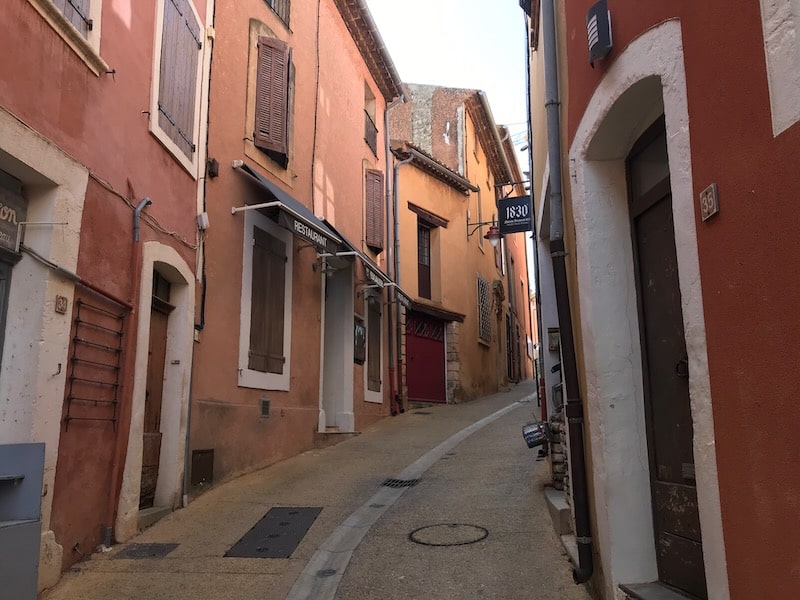
I almost didn't make it through this little street in the village of Roussillon in northern Provence
Roads, too, can be narrow, with barely room for two-way traffic (you may even have to stop to let someone by).
Also, parking garages are often tiny, and maneuvering in and out can be a nightmare (I speak from experience).
Insuring a car in France is not optional.
You definitely need insurance, because a shattered windscreen or minor dent can add up. Worse, you can hurt someone and be liable for their medical costs.
Discovercars provides the option to buy full insurance coverage but that said, you may not need the full package, so read the fine print.
Credit cards often provide car insurance coverage if you use their card for your rental, so check that first. If your card does provide insurance, make sure it includes some sort of roadside assistance.
You may already have some coverage through your homeowner's policy or your car insurance back home – or through an automobile association, if you belong to one.
Just know that in France, you MUST be insured to rent and drive a car: it's the law. But where you get your insurance is up to you.
Where you actually pick up your rental can make a difference.
A rule of thumb is this: in large cities, rent outside town or in a suburb, and in small towns, rent anywhere. This is because of heavy traffic in cities, where signposting is often poor and drivers impatient with slow-moving foreigners.
Probably the easiest is to rent from an airport car agency, if you're flying in − no need to battle downtown traffic (although, word of warning, airport rentals are sometimes more expensive).
Next in line is a TGV train station, which is often outside town.
If neither of these is possible, then try to rent at or near a train station in town. Streets around a station are traditionally well-signposted, and this should make your life marginally easier.
If the city has more than one station, pick the one closest to the direction you'll be driving.
Under no circumstance should you rent a car in Paris unless you're familiar with driving in the city. You wouldn't want to get caught in France's busiest roundabout, would you?
I've been driving in France for decades (including in such driving black zones as Lyon or Nice) and you couldn't pay me enough to drive through central Paris. Not a good idea.
Yes, this is better than 1000 words:
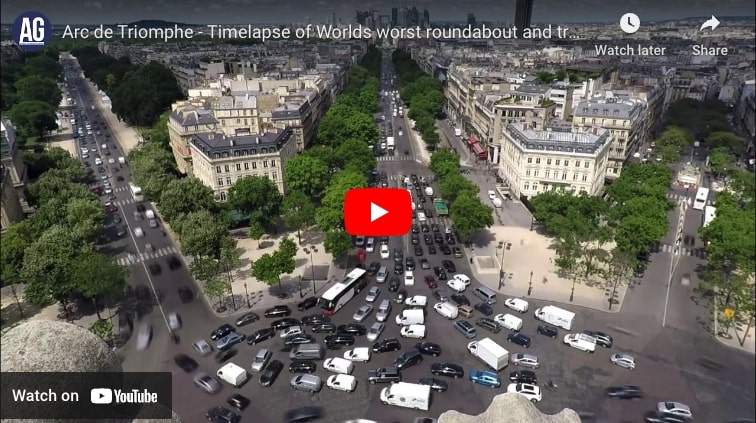
And a few final tips about choosing your car rental agency:
PLANNING TO DRIVE IN FRANCE?
You owe it to yourself and others to be the safest and most confident driver you can be, and in France, that can be a challenge.
This online course is a quick and enjoyable way for you or your second driver to learn our driving rules. I live and drive in France, and even I learned things to make my drives more enjoyable and relaxing and remove a lot of the stress. Find out more here.
I have an entire article about driving a rental car in France (or any car, for that matter) and I encourage you to read it to get the fullest picture. Meantime, here are a few essential rules you need to know before you get on our French roads.

PRO TIP ➽ While you should always follow the speed limit signs on any road, be extra careful when you see THIS sign.
It means there's a speed radar nearby, and there's every chance it's active.
While driving in France is not radically different from other countries, there are unfamiliar signs and (sometimes illogical) rules, and roads can be narrow and winding. A little knowledge may go a long way.
You can see some of the main road signs here, or buy a complete guide to carry with you when you travel.
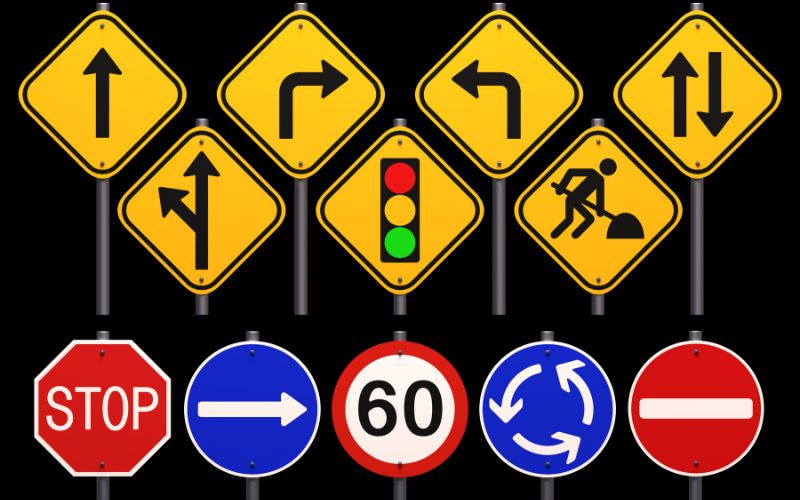
Road signs in France may be different, but they're usually understandable: red means don't, blue means do, and yellow means be careful
Most motorways are private, and each company sets its own price, which also can fluctuate from year to year.
There is an umbrella organization that groups all the highway companies but their website hasn't been updated since 2021. Your best bet is the Via Michelin route planner, which is updated frequently and can help calculate distance and costs for your entire journey.
The word for toll in French? PÉAGE. Signs usually start quite a ways before you reach the toll booths.
Some toll booths are enormous. Don't be intimidated. If you're entering the motorway here, any machine will give you a ticket. If you're leaving it, then follow the signs below.
A green downward arrow is what you're looking for. This means all payments are accepted – cash, card or pass (you won't have a pass since you don't live here).
An orange "t" sign means you need a pass to enter. Not for you.
Two superimposed faint white credit cards mean you can pay with a smart card. Unless you have a French or an EU credit card with a smart chip, avoid these. The toll system doesn't take all cards, and if it doesn't like yours, it might swallow it and you may not get it back for weeks.
A red cross means do not enter.
A speed limit sign with an orange "t" is for pass-holders only, and means they can slow down and go through without stopping.
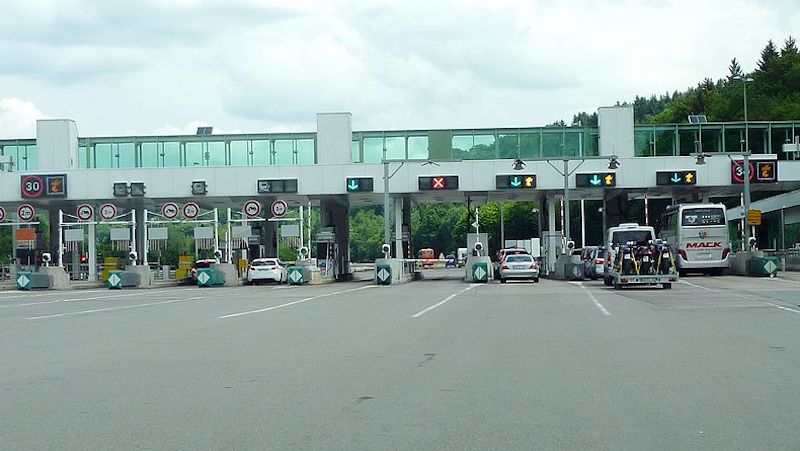
A variety of autoroute toll signs, from left: for orange T-pass only, slow down to 30kph; very faint credit card sign: pay with card only; green arrow means all methods of payment; red cross: do not enter; green arrow with orange-T means everyone can go through and pay with any method; and again, slow down with orange T-pass. Photo by BlueBreezeWiki, CC BY-SA 3.0, via Wikimedia Commons
I mentioned earlier that one of the first things you should do is note the emergency numbers to call for both your car rental and your insurance.
In an emergency, if it's a serious threat, call the police first. The number (it's the same across Europe) is 112. As soon as you can when things begin to clear, call the insurance and your car rental agency.
It would be good to have a translation app on your phone, one you can use to relay a message in French if needed.
Be sure you have a connection and internet access in France. You can always use a digital SIM card for this purpose.
I hate to bring it up, but do you really need to rent a car? There are strong arguments for and against, and I'll lay them out here for you.
If you're visiting mostly cities, then no, you don't need a rental car in France. In fact it would be more of a hindrance than a help.
Public transportation is plentiful and parking in French cities is difficult: ceilings are low, parking spots can be tiny, prices are sky-high.
The excellent train network will reach most cities and towns in France.

France's large cities - like Lyon - are best seen without a car
If you plan on visiting the countryside and don't have your own car, then yes, renting a car in France makes perfect sense.
Some regions simply require a car, places like the Alps, its villages filled with narrow streets and linked by winding mountain roads, or wild places, like the Ardèche, with its rushing rivers and not a train station in sight.
For Paris: No. Never. Not. Renting a car in Paris is a bad idea.
For Burgundy: For city hops to Dijon or Beaune, no car is needed. But if you plan on driving the Route des Grands Crus and sample Burgundy wines along the way, then most certainly, yes. Or, you could rent a bike for part of the route.
For the French Riviera: Not in summer, when roads are bloated with traffic and driving is crazy. Along the coast, just use the train. Off-season, yes, a car is wonderful, for example if you want to follow trails like the Mimosa Route.
For Provence: Provence is one of those iconic regions whose tiniest corners beg to be visited, but which cannot be seen without a car. So yes, you do need a car in the south of France. Public transportation is scarce, especially to places like the hilltop villages of the Luberon.
If you're headed to Provence, here's my ten-day south of France itinerary to help you plan a fabulous trip!
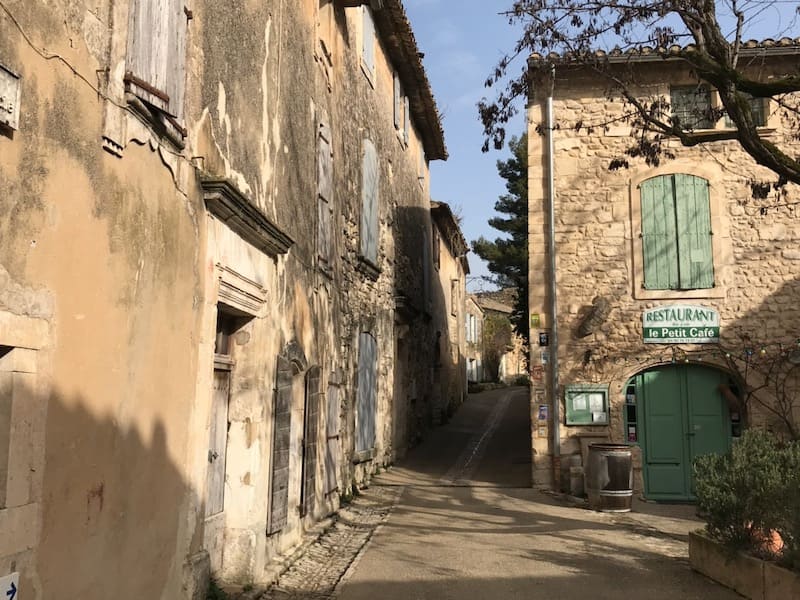
Some of France's most beautiful villages require a car to reach
For the Basque region: No need for a car if you're sticking to towns like Bayonne, Biarritz, Saint-Jean-de-Luz. The gorgeous interior, however, does require a car, especially for if you want to take a Basque country road trip.
For the Loire Valley chateaux: A few of the chateaux can easily be reached on a day trip tour from Paris, or by train if you're headed to Blois or Amboise. But for a longer visit or to see some of the more remote chateaux, a car is needed.
For Brittany: Yes, you'll need a car. You can catch the train to one of the main cities, but Brittany is so much more than pretty villages.
THE BEST GUIDEBOOKS TO ROAD TRIP WITH YOUR FRANCE RENTAL CAR
Getting some of this knowledge ahead of time will help! If you wait till you get here, you might find most available guidebooks are in French.
➽ Lonely Planet's Best Road Trips France
➽ DK Witness Road Trips France
➽ Any of the Green Guides series - they all have excellent regional itineraries, which I use
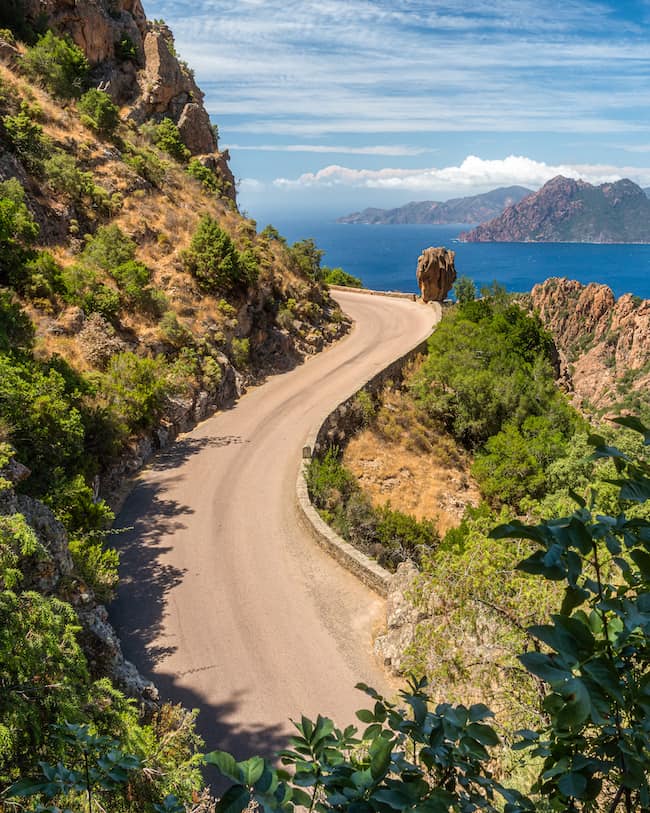
You'll go off the beaten path with a car rent in France, much more so than you would if you stayed on the main highways
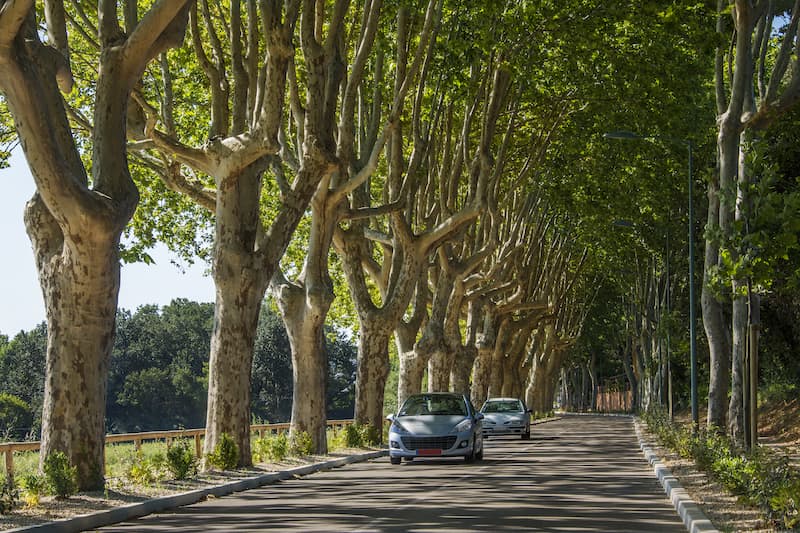
➽ I don't always drive my own car around France. When I rent, I first check Discover Cars, which scours ALL car rental agencies for the best deals. 🚗
I think I've covered most things you need to know about renting a car in France BUT. here are even more driving in France tips you'll be happy to know.
How do you say car in French? Or automatic transmission?
Here are a few words and terms that might be of use when you rent a car in France. I've added a short voice recording so you know how to pronounce these!
Oops! Your browser does not support the audio element. Please use another browser or upgrade your current browser.
Can you rent a car in France with a US licence?
Renting a car in France as an American usually requires an IDP, or International Driving Permit, available from your AAA. However, a number of agencies will accept an official translation of your licence, and at times will also accept just your licence. (Renting a car in France as a Canadian follows the same process.)
To find out documentation for a hire car in France, go to Discovercars, Search for the car that interests you, and check the "Rental Conditions" section to see what kind of paperwork you need.
Can you rent a car in France and drive to Italy/Switzerland/Germany/Spain?
Yes, but you need permission from your rental agency. You must let rental companies know you plan to cross a border, and there may be an additional border crossing fee to pay.
There might also be rental car rules in the other country, or driving rules. For example, in Switzerland you need to have an autoroute sticker on your car. Otherwise, you have to stay on secondary roads. You can buy the sticker at the post office or any border stop.
Can you rent a car in France at 18? How old do you have to be to rent a car in France? What's the minimum age to rent a car in France?
The driving age is 18 but the car rental age in France is usually 25, although some agencies may let you rent a car at 21.
Can a tourist rent a car in France?
Absolutely, as long as you fulfil the requirements and have the right documents.
How much is a France rental car? Is it expensive to rent a car in France?
Renting a car in France is moderate to expensive when compared to other countries. For example, Paris is more expensive than Madrid or London but less expensive than Rome and much less expensive than New York City or Chicago. You can comparison shop and find reasonable rates here.
Which is the cheapest car rental option in France?
That depends on where you rent, for how long, and the kind of car. Compare these various factors to find the cheapest car rental.
What are the rules for renting a car in France? What documents do I need to rent a car in France?
You need to have a valid driver's licence, be over 25, have a credit card and have insurance.
Do I need an international drivers license to rent a car in France?
Officially, you do, and having one will ensure you a hassle-free rental. However, many agencies will accept an official translation of your driver's licence, and some will also accept a licence. Check the "Rental Conditions" section of rental cars to be sure. A follow-up email or call would be useful to get a confirmation.
Does car rental in France include insurance? Do you need extra insurance to drive in France?
Car rentals in France do not include insurance, but insurance is compulsory. You can buy it directly when you rent, or you can use the insurance that comes with your credit card or home insurance policy.
Can you rent a car in France without a credit card?
Not often − but it's changing. Some of the major car rental companies are slowly beginning to accept debit cards, but check first, because it's still more the exception that the rule.
How safe is it to rent a car in France?
Perfectly safe. Rip-offs are few, and I've found agencies to be honest across the country (there may be a few rotten apples, but that's the case everywhere).
The only challenge in renting a French car is the actual driving. In most parts of the country, driving is quite straightforward, and will probably feel quite familiar. But there are exceptions, such as strange rules and odd behaviour, and my piece on driving in France paints an honest picture of my country's habits behind the wheel.
Enjoy your drive through France, a country whose beauty lies mostly away from its main roads. Here are some sensational French road trips to prove it!
SHORTCUTS TO POPULAR CAR RENTALS ACROSS FRANCE
➽ Car rental PARIS France
➽ NICE AIRPORT car rental
➽ Car rental BORDEAUX
➽ Car rental AIX EN PROVENCE
➽ Car rental LYON
Don't let renting a car in France scare you! It's no more complicated than renting a car anywhere else. And now that you're thinking of going for it, consider taking one of these 9 fabulous French road trips!
BOOK YOUR ACCOMMODATIONS
I use booking.com: for their huge inventory and for their easy cancellation policies
FLIGHT DELAYED OR CANCELED?
AirHelp can get you compensation (it works, I've used it)
DO YOU NEED A SIM CARD FOR FRANCE?
Here's the one I use when I travel abroad
PROTECT YOUR BELONGINGS
Keep pickpockets away with an anti-theft purse or an infinity scarf - and your identity with a VPN (I'm using Nord VPN)
TRAVEL INSURANCE
I recommend Visitors' Coverage or SafetyWing. for health away from home
GETTING FROM A TO B
I use Discovercars to rent cars and either Omio or RailEurope for train tickets
TO READ ABOUT FRANCE
Here's my long list of books about France
AND DON'T FORGET YOUR GUIDEBOOKS!
➽ Lonely Planet's Best Road Trips France
➽ DK Witness Road Trips France
➽ Any of the Green Guides series
➽ And, while you're at it, why not a map of France?